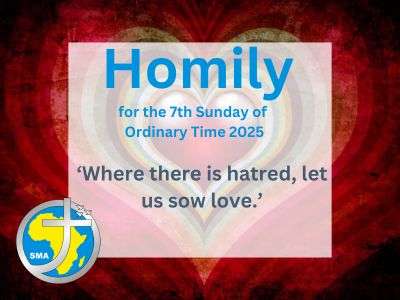Readings: 1 Samuel 26: 2, 7-9, 12-13, 22-23; 1 Corinthians 15:45-49; Luke 6:27-38.
Theme: ‘Where there is hatred, let us sow love.’
There are many kinds of love. In his encyclical letter, God is Love, Pope Benedict XVI distinguishes three main kinds: eros, the spontaneous attraction between a man and woman which tends towards union; philia, the mutual love that exists between friends; and agape or self-less and self-sacrificing love – the kind of love parents have for their children. Agape is manifested supremely in the life and death of Jesus Christ, particularly in his act of forgiving his enemies as he was dying in excruciating agony on the Cross. This supreme expression of Christian love is the central theme of today’s readings.
Listen to audio version:
The desire for revenge is deeply ingrained in us. I remember as a young lad being enthralled by the novel, The Count of Monte Christo, a classic tale of revenge. The protagonist and hero of the story is Edmond Dantes, who is betrayed by his friend, Fernand, falsely accused of treason, and imprisoned in frightful conditions for thirteen years. With the help of a fellow prisoner, he eventually escapes, and exacts revenge on those who had so cruelly betrayed him. As a teenager, I found it easy to identify with Dantes’ desire for revenge, and felt a certain justice in the clever way he ‘turns the tables’ on those responsible for his unjust incarceration. Later in my life, however, I came to realise that the apparent ‘sweetness’ of revenge is short-lived. In the end it leaves the heart sullied and empty. Revenge and retaliation only add darkness to darkness, extinguishing the light that might lead to transformation. Only love has the power to transform. In the words of Pope Benedict XVI, ‘Love is the light – and in the end, the only light – that can always illuminate a world grown dim and give us the courage needed to keep living and working’ (God is Love).
Our first reading today sets before us the example of David, who resisted the urge to revenge himself on King Saul who was jealous of him and wanted to kill him. Under cover of darkness David and his companion, Abishai, make their way into the camp of King Saul and find him asleep with his spear close by. Though David could have killed Saul, he simply makes off with his spear. He later returns the spear and tells Saul the reason he did not take advantage of the opportunity to kill him: ‘Today the Lord put you in my power, but I would not raise my hand against the Lord’s anointed’ (1 Sam 26:23).
The revolutionary moral precepts of Jesus in today’s gospel go far beyond merely resisting the desire for revenge. Based on the foundation of the beatitudes, they develop the practical imperatives of the fourth beatitude: ‘Happy are you when people hate you, drive you out, abuse you, denounce your name as criminal, on account of the Son of Man’ (Lk 6:22). Jesus wanted a world transformed by the power of love, where the barriers of distrust are overcome and the legacies of hatred dissolved; where hurts are healed by compassion and misunderstandings resolved by forgiveness. So he exhorts his disciples to bear hatred, insults and scorn with patience, without seeking to be avenged. But he wants even more of them, spelling out a list of seemingly impossible positive demands: ‘love your enemies; do good to those who hate you; bless those who curse you, and pray for those who maltreat you (Lk 6:27-28). As difficult as these precepts may sound, they embody the highest ideals of Christian life and virtue. They challenge us to respond to darkness with light, to respond to what is worst in others with what is best in us. They invite us to imitate the perfect love of the Father, whose compassion extends to the ungrateful and wicked alike: ‘Be compassionate as your Father is compassionate’ (Lk 6:36).
Sadly, we live at a time when violence and a culture of revenge seem to be spiralling out of control rather than diminishing. In such a context it is a matter of the utmost importance that we Christians embrace the gospel teachings of Jesus on the love of enemies. His teaching and example must inform our choices in life, especially the choice to do good, to love, and especially to forgive. In the words of Martin Luther King Jr., ‘Those devoid of the power to forgive are devoid of the power to love. In his Encyclical Letter on Fraternity and Social Friendship, Pope Francis reminds us that ‘Those who truly forgive do not forget… Instead, they choose not to yield to the same destructive force that caused them so much suffering. They break the vicious circle; they halt the advance of the forces of destruction. They choose not to spread in society the spirit of revenge that will sooner or later return to take its toll’. We might think that forgiveness means either ignoring or forgetting about justice. On the contrary, forgiveness is the foundation of justice. In the words of Pope Francis: ‘Forgiveness is precisely what enables us to pursue justice without falling into a spiral of revenge or the injustice of forgetting’.
Let us end with the prayer of St Francis of Assisi: ‘Where there is hatred, let us sow love; where there is injury pardon, … for it is in giving that we receive; it is in pardoning that we are pardoned, and in dying that we are born to eternal life. Amen’.

